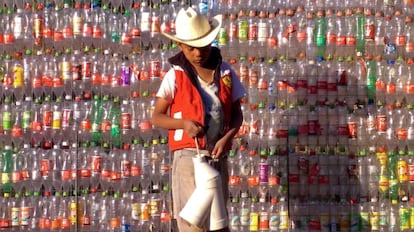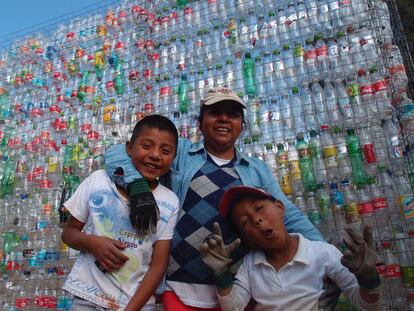After catastrophic earthquake, Mexico rebuilds with plastic bottles
An initiative in Morelos is building homes toppled in the September 19 quake with recycled PET


Coca-Cola, Sprite, Pepsi and Lipton Ice Tea are just some of the brands on display on the labels of plastic bottles that will make up the new home of María Guadalupe “Lupita” Jiménez, in the town of Tetela de Volcán, in the Mexican state of Morelos. The earthquake of September 19 left her and her two children without a roof over their heads. But now, volunteers from the organization Viviendas Emergentes, or Emerging Homes, (VIEM) are helping her to build a new home – one bottle at a time.
Once finished it is very solid Josefina Guzman, resident in VIEM plastic bottle home
At first Lupita didn’t trust the idea of using plastic bottles: “There were two-story houses with uprights that fell down with the quake, and I thought this is not going to hold up.” Her house, an adobe cabin across from her parent’s place, “opened up like a box and closed in on itself.” Luckily, when the the 7.1-earthquake hit, 55 kilometers from this town with a population of under 10,000, a quarter of them in extreme poverty, Lupita had just left to take her kids to school. “We stood there, hugging one another, praying,” she recalls.
That same day, the architects Vanessa Rendón and David García were in a 12-story tower which they were building for their studio in the state of Querétaro. When they saw the gravity of the destruction – dozens of houses collapsed, hundreds dead, thousands of building damaged – David jumped in his car to lend a hand in the recovery. Vanessa, 25, asked her parents for permission to do the same.

“They told me no, that I could help from Querétaro, that I should go to a collection center,” she says from Tetela, while taking a break from building Lupita’s house. “I stayed behind, furious, watching the news, when President Enrique Peña Nieto appeared and mentioned three stages: search and rescue, census, and reconstruction.” It was the inspiration she needed to leave her job, her family home and move to the capital to launch VIEM – all in less than two weeks.
While Vanessa remembers this, the VIEM team continue working on two constructions in the town: the house of Lupita, made from plastic, and another one for her neighbor Avi Nadal, which is being made from bricks used in beekeeping which were donated to them. It’s a small team. As well as the four founders of VIEM, there are two school friends of David – the only ones who come every weekend; the mother of one of them, and a lawyer from Tamaulipas. Some neighbors and Lupita’s family are also pitching in – including her sons, eight-year-old Lalo and five-year-old Luis Enrique.
I am going to devote my entire life to this. I am sure it is going to work Vanessa Rendón, VIEM member
“Every week four or five people come but we need 10 people for each house and weekend. In other words, we are 20 people short,” says Vanessa. The idea is for the VIEM team to work Saturdays and Sundays while the families help fill plastics bottles with dirt or help slot the bottles into the metal wiring. VIEM does not charge the locals for their help, and in exchange they are offered free food and a place to sleep. The organization says that people are happy to donate plastic bottles but it is more difficult to receive financial support. “To grow we need capital and volunteers,” says Vanessa.
As part of the initiative, the 25-year-old opened a Facebook page and called on people to donate plastic bottles that could be used in the reconstruction. A few hours later, thousands of people were asking where they could drop off their bottles, she says. The organization began to receive help from people in Mexico City as well as businesses who offered trucks to move the PET cargo. In the capital alone, they were able to collect one million bottles. Around 15,000 bottles and 60,000 to 80,000 pesos (€3,000 to €4,000) are needed to build a 40-square-meter house. VIEM has built three houses and there are three more on the way, which should be completed by mid-April.
Around 15,000 bottles are needed to build a 40-square-meter house
Josefina Guzman and her husband and son live in one of the VIEM houses. “In the beginning when they told me that it would be built with bottles, I had no idea what it would be like, I could not imagine it,” she says laughing. “But once finished it is very solid. There was an earthquake the other day [on Friday 17], and I was inside and didn’t even realize.”
In the state of Morelos, where Tetela is located, 74 people died in the September 19 earthquake. According to official data, 862 homes were damaged in Tetela, and another 1,200 in the surrounding towns. Locals complain that the reconstruction effort, led more by social organizations than federal authorities, has been slow and more funding is needed.
VIEM officials meanwhile are getting help from a notary to make sure they can receive donations directly and not through third parties. They are putting together a business plan to ensure their six-month-old organization remains viable.
“We have not given so much already for this not to work,” says Vanessa. "I am going to devote my entire life to this. I am sure it is going to work."
English version by Melissa Kitson.
Tu suscripción se está usando en otro dispositivo
¿Quieres añadir otro usuario a tu suscripción?
Si continúas leyendo en este dispositivo, no se podrá leer en el otro.
FlechaTu suscripción se está usando en otro dispositivo y solo puedes acceder a EL PAÍS desde un dispositivo a la vez.
Si quieres compartir tu cuenta, cambia tu suscripción a la modalidad Premium, así podrás añadir otro usuario. Cada uno accederá con su propia cuenta de email, lo que os permitirá personalizar vuestra experiencia en EL PAÍS.
¿Tienes una suscripción de empresa? Accede aquí para contratar más cuentas.
En el caso de no saber quién está usando tu cuenta, te recomendamos cambiar tu contraseña aquí.
Si decides continuar compartiendo tu cuenta, este mensaje se mostrará en tu dispositivo y en el de la otra persona que está usando tu cuenta de forma indefinida, afectando a tu experiencia de lectura. Puedes consultar aquí los términos y condiciones de la suscripción digital.








































